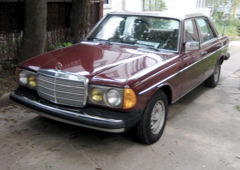Here's the deal: for a while now, I've been hearing rumors and discussion about how bad the copper heating tubes in my vegetable oil tank are for the car - supposedly, they cause polymerization and oxidation of the oil, possibly causing damage to engines. This worries me, but I haven't been able to find any proof. I searched scientific literature to no avail.
After looking around, I found this discussion by a Mr. Joe Beatty that addresses these claims (this discussion can be found on this page ). The problem is, I don't completely agree with some conclusions drawn by the author, and in some cases, he doesn't present enough data to make any conclusions - especially when addressing his most worrisome claim - that copper causes viscosity to rise - so I have no idea I agree with his conclusions or not.
My take on Beatty's work:
First, the author heats up vegetable oil to 70C in the presence of copper and observes that the oil's peroxide number increases, and then, decreases such that by the end of the experiment, the sample exposed to copper is less oxidized than the control sample. The author states that this experiment illustrates the how much the copper oxidizes the vegetable oil. If anything, this data shows a protective effect!
The next few experiments deal with free fatty acids, are presented without adequate control, and don't seem to be much of a problem, so I will not comment on the author's conclusions.
The final section is where I believe the meat of the problem lies. The author theorizes that oxidation reactions cause the vegetable oil to polymerize. He further observes an increased viscosity in oil exposed to copper and heat over time. However, he does not present his data with a control - it is possible that simply heating oil in the presence of air causes the viscosity to increase. After reading this discussion, I still don't know if exposure to copper will cause the viscosity of oil to increase.
The author concludes by again theorizing that the oxidation of the vegetable oil may be causing a polymerization to occur. Whether or not I agree with this theory, it seems like a somewhat large leap to take, given the volume of data presented.
Let's address the possible issues:
Oxidation: oxidation alone doesn't really worry me. I'm burning this oil, not cooking with it. If it goes rancid (another descriptor for oxidized oil), what do I care? What's another term for burning? Rapid oxidation. If the oil is slightly oxidized before it reaches the injector, I don't much care.
Polymerization: If the oil polymerizes when exposed to copper, that worries me a lot. Even if a material polymerizes slightly, the viscosity will rise rapidly. Polymerization is certainly possible: copper is a reactive surface, and it certainly might cause some random reaction to happen. Since I don't know what reactions might be happening, and viscosity reacts strongly when polymerization occurs, I will focus on viscosity.
Viscosity: This is the issue I'm most worried about. Does the viscosity of vegetable oil go up when exposed to copper and heat? The author hasn't done a good job of convincing me either way.
Heat: I suspect that the real culprit here is heat, not copper. Heat often triggers all kinds of reactions - including polymerization and oxidation.
Metals: Metals may play a role as a catalyst in this situation, and copper is a relatively reactive metal. However, given copper's superior heat transfer capabilities, ease of manufacturing, and affordability, it is worth investigating further to discover what reaction vegetable oil has when exposed to it before shunning it altogether.
My solution:
I have an idea for an experiment - I'm going to heat up some oil samples both with and without copper present, and with some other common tank materials (aluminum and stainless steel). I will then measure the viscosity using the tried and true Ubbelodhe type capillary viscometer. I like it because it provides completely reproducible results and is a beautifully simple device design. Heck, it's all glass, so you can immediately see if something is wrong. I'm also going to make sure that I have as many controls as possible. Experiments without proper control groups don't illustrate anything.
Samples:
Control1
Expose to air; Measure before heating, after heating for 1 day, 3 days, 5 days.
Control2
Expose to air; measure after 5 days
Copper1
Expose to air; Measure after heating for 1 day, 3 days, 5 days
Copper2
Don't heat; Expose to air; measure after 5 days
Steel1
Expose to air; Measure after heating for 1 day, 3 days, 5 days
Steel2
Don't heat; Expose to air; measure after 5 days
Aluminum1
Expose to air; Measure after heating for 1 day, 3 days, 5 days
Aluminum2
Don't heat; Expose to air; measure after 5 days
WVO1
Measure filtered WVO from a storage tank
WVO2
Measure WVO from my vegetable oil fuel tank (my tank contains copper heating coils)
Note1: all oil samples will be 100% Canola oil, unless otherwise noted
Note2: all metal samples are samples of tubing, similar to the tubing used in tank heating coil construction, for more realistic testing on the bench top.
I will begin experimentation on Monday. When completed, I intend to publish my results on this website.
Thursday, June 7, 2007
Subscribe to:
Post Comments (Atom)

Great analysis. What was the result of your experiment?
ReplyDeleteDarryl Cornish